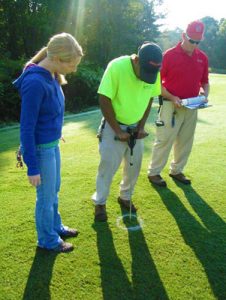
A grassroots composting effort from NC State students and staff is strengthening literal grass roots on the university’s recreation fields at Centennial Campus.
In fall 2014, University Recreation and Grounds Management partnered to study the viability of using compost instead of traditional fertilizer to maintain the health of grass on the university’s recreation fields. With the help of students Morgan Malone and Lindsay Edwards, two recreational fields on Centennial Campus were included in a study that compared the soil health of a field receiving compost versus a field receiving traditional fertilizer.
After students conducted initial soil and compaction tests, the field receiving the compost was aerated and topdressed with a quarter inch of compost, which was blended into the turf with a drag mat. The students later conducted follow up testing to monitor turf and soil health over time.
“The students were an integral part of the project and truly helped to make it a success,” said Whitney Stevens, a Grounds Management maintenance planner.
The idea of using compost on campus recreational fields stemmed from the 2014 Collegiate Sports Sustainability Summit, which several NC State employees attended and saw firsthand the success of compost applications on University of Colorado recreational fields. Through PackLink, an online resource for sustainable project collaboration at NC State, Malone discovered the project and saw a perfect opportunity to help advance campus sustainability.
“I learned a lot from the project, especially how to collaborate with others to see a vision come true,” she said.
Part of the long-term vision is for a campus composting facility, which is being studied for its potential to create a closed-loop system where compostable waste from campus could be transformed into soil amendment to nourish campus plant growth. Currently, food waste and other compostable waste from campus is transported more than an hour to a private composting facility.
“University Recreation would absolutely consider composting to maintain future fields as we look at more sustainable ways to do business,” said Jason Spivey, University Recreation’s associate director for facilities and resource management.
In this study, soil tests showed positive soil health and compaction, resulting in turf growth very similar to the results achieved in synthetically fertilized areas.
“We are interested in reducing our use of synthetic fertilizers and have been investigating more financially and environmentally sustainable alternatives such as compost,” Stevens said. “This study affirmed that compost can be used as a substitute to, or to reduce the use of, conventional fertilizers. We intend to topdress with compost again and continue to build healthy, fertile soil to help turf prosper.”